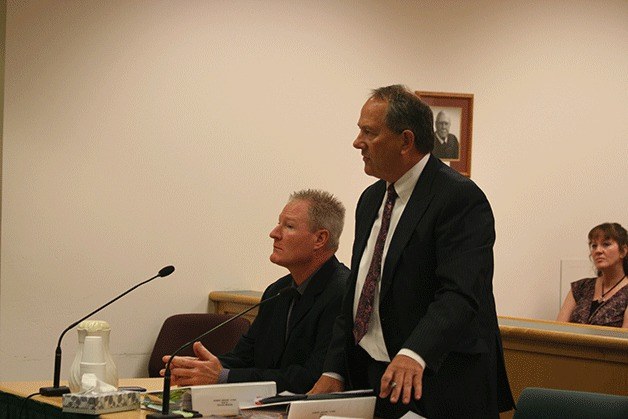The lawyer for former Coupeville deputy marshal Hodges Gowdey says a “ruse” was used to get his client to make self-incriminating statements.
During an evidentiary hearing Friday, attorney Chris Skinner said that Gowdey’s statements during an interview with Detective Sgt. Teri Gardner should be inadmissible because they were gathered under false pretense.
Friday’s hearing in Island County Superior Court, which included testimony by Gardner, who works for the Oak Harbor Police Department, Gowdey and former town marshal Lance Davenport, was continued until next week.
After the evidentiary hearing is completed, Judge Alan Hancock is expected to make a ruling on whether or not Gowdey’s interview with Gardner is admissible evidence.
GOWDEY WAS charged in February with unlawful imprisonment and witness tampering after a former girlfriend of Gowdey told Island County Undersheriff Kelly Mauck about an alleged 2007 incident.
The incident was the focus an internal investigation at that time and no wrongdoing was found.
Gowdey reportedly handcuffed his former girlfriend and subsequently said he did it because he thought she was suicidal.
Later, Gowdey allegedly coached her to omit parts of the story, according to court documents.
THE INCIDENT came to light again, however, during a routine check into Gowdey’s background by the Island County Sheriff’s Office.
The former girlfriend reportedly changed her story from the 2007 version while speaking with Mauck in 2013 and added new information, according to Skinner.
Davenport said Friday he worked with the sheriff’s office and agreed that the Oak Harbor Police Department should conduct an investigation into the new allegations against Gowdey to avoid potential conflicts of interest. The former girlfriend, until recently, was an employee of the Oak Harbor Police Department.
The Snohomish Sheriff’s Department has since taken over the investigation.
Gowdey’s background was being checked because the sheriff’s office was taking over police services for the Town of Coupeville and Gowdey would have become a deputy sheriff.
ON THE morning of his arrest, Sept. 7, Gowdey arrived at work and was asked by Davenport to sit down and talk with Oak Harbor police detectives.
Several members from various law enforcement agencies were also on site but out of sight, according to Davenport.
Davenport said he and Gardner agreed that Gowdey, who was being investigated on the criminal allegation, would be told he was meeting with Oak Harbor detectives as part of “an internal investigation” concerning a police department staff member.
DAVENPORT INITIALLY testified that Gardner was the source of the “internal investigation” idea, but later restated it as someone from the police department.
“At that point, that was the plan we came up with,” Davenport said.
“You never volunteered anything (to Gowdey) about the accuracy of what was going on,” Skinner said.
“No, I did not,” Davenport said.
In the case of an internal investigation, law enforcement officers must be given a Garrity warning which forces them to comply and answer all questions truthfully or be fired, but those statements cannot be used in court.
In the case of a criminal investigation, suspects must be read their Miranda rights.
“THE GOAL of the internal investigation is to get the information …” Skinner said. “You want to make sure people understand they are free to talk and it won’t be used against them in a court of law.”
Despite the claim that police were conducting an internal investigation, Gardner testified she read Gowdey his Miranda rights before beginning the interview.
Gowdey testified that this confused him since he believed he was helping with an internal investigation.
Gowdey testified that he asked Gardner if he was a suspect and that she dodged the question and refused to inform him he was a suspect.
Gowdey testified that he said, “If I am a suspect, this interview is over.”
Gardner said it is her training to “continue on until they ask for an attorney.”
“You didn’t tell him the truth … because he was a suspect,” Skinner said.
“Correct,” Gardner responded.
BASED ON what he was told, and believing he was not a suspect, Gowdey testified that he continued to talk to Gardner.
While being questioned by Skinner, Gardner repeatedly said she didn’t recall telling Gowdey that the police department was conducting an internal investigation.
“I remember there was a plan for an investigation,” Gardner said. “I don’t recall if it was internal.”
Prior to interviewing Gowdey, Gardner said she had “weak, weak probable cause” in the case against the former deputy marshal and “wanted more than that.”




